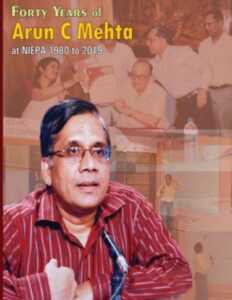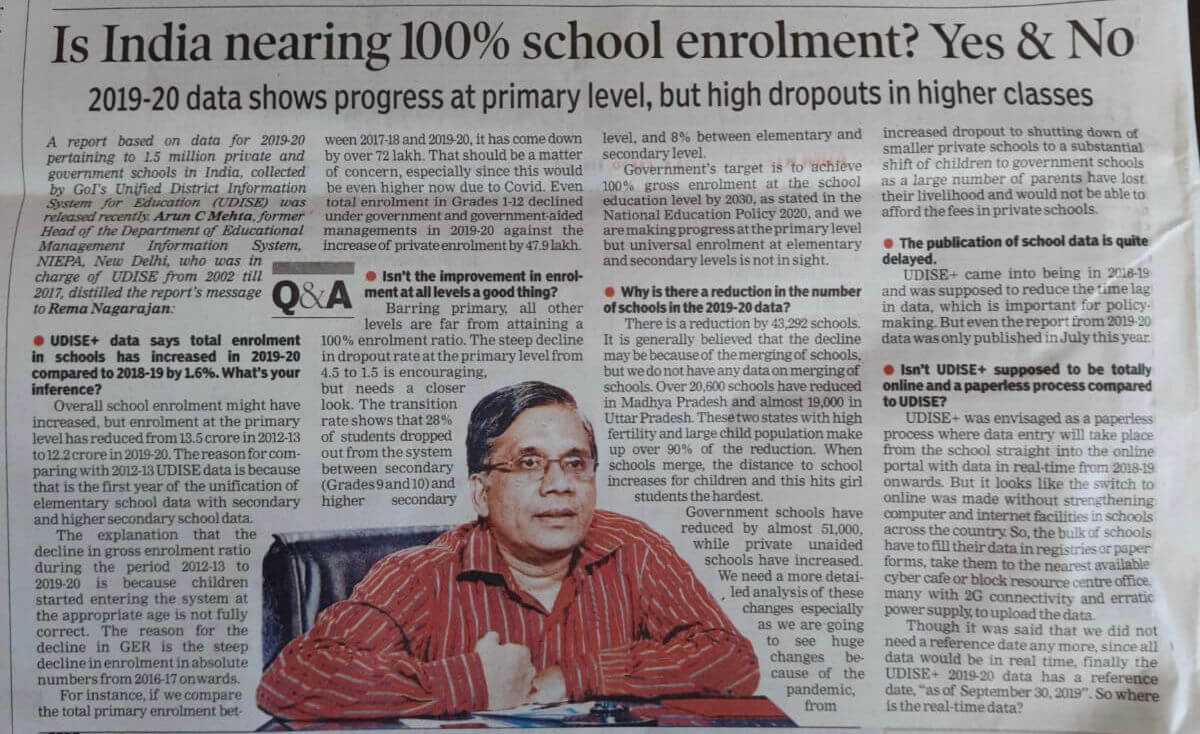A Study of Planning Process Under DPEP: Aurangabad District
By N.V.Varghese and S.M.I.A. Zaidi, NIEPA, New Delhi, India, 1999
ground
The study was aimed at analysing the district planning process and the role of local bodies in developing and implementing district plans. One of the 42 districts where DPEP was launched in its first phase in 1994-95 was selected for the study, which is Aurangabad district in Maharashtra. The study had two fold objectives (i) to analyse the planning process under the DPEP in Maharashtra and (ii) to study the involvement of various local bodies in the planning and management of DPEP activities.
The study covers 3 Panchayat Samitis, 13 Village Panchayat and 23 Village Education Committees of Aurangabad. It is based on detailed interviews and discussions to collect information from 129 Village Panchayat members of 13 selected Village Panchyats and also 224 VEC members from 23 selected VECs from 3 blocks namely Aurangabad, Kannad and Vaijapur. Discussions were also held with members of PRIs at district and block levels, functionaries of DPEP, and DIET staff.
Major Findings
Planning for DPEP in phase I districts in Maharashtra started in May, 1993 when the first meeting was held at Mumbai. This meeting, organised at the instance of the Secretary Education, was attended by the members of the National Core Team and educational functionaries at the state and district levels. The meeting helped identifying the activities to be undertaken to prepare district plans. This meeting was followed by a number of meetings organized at the district and sub-district levels to orient the functionaries to the major concerns of DPEP. Various Committees were constituted at the district and sub-district levels and they also organized various meetings at the block and village levels to facilitate participatory process in developing district plans. However, there is little evidence, which shows nature of participation in the planning process. Information regarding the participatory meetings is not maintained and moreover due to transfer and other dislocation of the educational functionaries who were closely associated with the DPEP planning in 1993-94, there is no institutional memory available to identify the people who were actually involved with the DPEP planning exercises. In many states the planning process involve active consultation with the elected representatives and the general public. At times the DIETs took the responsibility of playing a facilitating role. It needs to be mentioned that even when the elected representatives could not take an active part in the plan preparation process, consultations with teachers, parents and general public took place on a wider scale when the plans were prepared initially.
Discussions with the educational functionaries provide insight into the process of implementation of DPEP programme. At the district level the district executive committee is responsible for implementation of the programme. The Chief Executive Officer (CEO) of the Zilla Parishad is Ex-officio Co-ordinator of the programme. The Education Officer (Primary) of the district is an Ex-Officio District Project Officer, the Deputy Project Officer who is a full time employ of the DPEP is mainly responsible for the day-to-day activities. This shows that the Ex-Officio members almost control all the activities related to implementation of the DPEP. Infact, they control all aspects related to financial flow and administrative regulations. Since the Ex-Officio members are not full time project officers many a time they are busy with general administration and hence they are not available for detailed planning exercises. In the given administrative arrangements the power and authority rest with ex-officio members and the responsibility of managing the programme activities rests with the full time project functionaries. This at times acts as a constraint to innovate and initiate various activities under the DPEP.
Village Panchayat members do not directly involve themselves with issues related to management of educational activities at the school level. Mostly this is done by the VEC members. However these members are involved in the transfer of funds to various school related activities. The planning and allocation decisions are mostly taken at the district level. In case of activities related to construction, the local panchayats play a more direct role. At the Panchayat level nearly half of the members said that they are actively involved with the construction activities. Issues related to primary education are discussed in the panchayat meetings. It is found that VECs meet quite often and most of the members attend meetings regularly. Our analysis shows that the involvement of the Village Education Committee members is more to solve the problems related to improvement of school facilities involving civil works and irregular attendance of students. Although, they also intervene in issues related to teacher absenteeism., it does not emerge as a major area of discussions in the VEC meetings. However, the VEC members are directly involved in extra-curricular activities like organising some functions in the schools. However, their major involvement is in construction activities.
The VEC members do visit the schools but these visits are not very regular. Even when they visit the school it is mainly for ensuring local monitoring of teacher regularity and student attendance. Although teacher absenteeism is not a major area of discussions in the VEC meetings, this is an area of concern when they visit the schools. Both the VEC members and Village Panchayat members feel that they are not adequately equipped to deal with the issues related to planning and management of educational programmes. They expressed their strong desire to have training or orientation programme to get familarised with the objectives of the educational programmes, sources of funding and the way to prioritise activities to be undertaken under any central or state sponsored programmes. Therefore, orientation programmes for the VEC members need to be an important area of intervention to strengthen local processes in planning and management of primary education.





